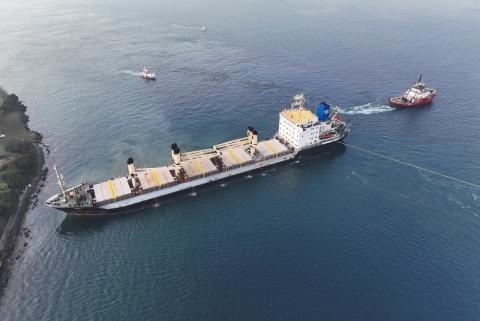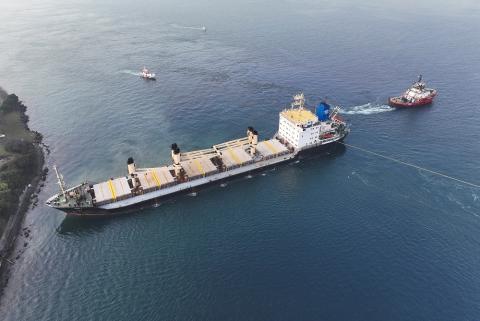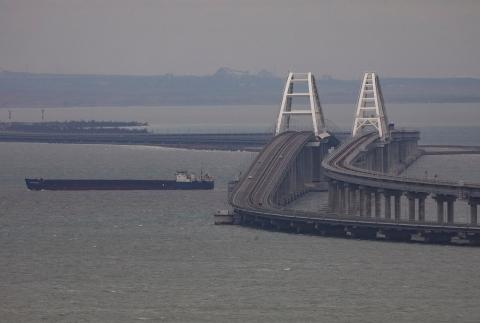
Russia has said it will pull out of a UN-brokered grain export deal after a dramatic attack by Ukrainian airborne and underwater drones on its Black Sea naval base of Sevastopol in the early hours of Saturday morning.
Social media showed footage of explosions both near and in the Crimean harbour, and Russia’s defence ministry said there had been an attack by “nine unmanned aerial vehicles and seven autonomous sea drones” that began at 4.20am.
A spokesperson for the ministry initially said the Ivan Golubets minesweeper had suffered minor damage in the incident, but there was immediate speculation by Russian and Ukrainian sources that the flagship Admiral Makarov may also have been hit.
The ministry later said in a statement via the news agency Tass that it had suspended “participation in the implementation of agreements on the export of agricultural products from Ukrainian ports”.
The UN-brokered deal had allowed Ukraine to resume grain exports from its Black Sea ports without fear of merchant ships being targeted, while Russia was allowed to export food and fertiliser.
Ukraine’s infrastructure ministry said on Saturday that the grain initiative had an “exclusively humanitarian character” and warned of a risk to food security if the deal was not restarted.
It said that it had exported 9m tonnes since 1 August, when vessels began sailing, including 190,000 tonnes of wheat “to countries on the brink of hunger” in Africa and the Middle East.
Sevastopol’s Russian governor, Mikhail Razvozhaev, said the raid on the port was the biggest mounted by Ukraine on the naval base in the war so far, and that all civilian CCTV should be turned off so as not to reveal the position of the city’s air defences.
Mykhalio Podolyak, a senior adviser to Ukraine’s president, Volodymyr Zelenskiy, appeared to obliquely claim credit for the attack and to suggest that it had taken a heavy toll on the Russian fleet at harbour. He tweeted:
Some Russian military bloggers said the Admiral Makarov, Russia’s main Black Sea frigate, had been hit in the raid, but there was no independent confirmation of this or full claim of responsibility from Ukrainian officials.
Andriy Tsaplienko, a Ukrainian journalist, posted a video later in the afternoon from a Ukranian drone targeting a Russian frigate at sea and other footage from the raid. They showed, he said, that the Admiral Makarov had been damaged along with at least two other ships that carry Kalibr cruise missiles.
“There is a good chance that several ships are not just damaged but sunk,” he wrote, but the claim could not verified.
A successful attack on any of Russia’s fleet would be a major success for Ukraine, which has no navy of its own. Russia’s flagship, the Moskva, was sunk by Ukrainian missiles in April, making the Admiral Makarov its most important warship in the Black Sea.
Russian-occupied Crimea has been the target of several daring drone and special forces attacks in the past three months, but Ukraine has been cautious about taking public responsibility for attacks that it knows will particularly irritate the Kremlin.
Moscow’s military said ships targeted at their Crimean base were involved in the UN-brokered grain deal, which Russia has recently criticised because its own grain exports have suffered as a result of western sanctions.
Russia also said Britain had helped Ukraine carry out the attack, accusing a Royal Navy specialist unit based in Ochakiv, in the south of the country, of giving guidance. No evidence was offered to support the claim.
The defence ministry also accused the same unit of sabotaging two gas pipelines in the Baltic Sea in September, although Russia is suspected of being the perpetrator.
“Representatives of this unit of the British Navy took part in the planning, provision and implementation of a terrorist attack in the Baltic Sea on 26 September this year, blowing up the Nord Stream 1 and Nord Stream 2 gas pipelines,” it said.
The attack has not been formally attributed to Russia, but the fact that Russian vessels were seen in the vicinity of the pipelines where they were damaged, points to Moscow’s involvement.
Britain dismissed Moscow’s statement. “To detract from their disastrous handling of the illegal invasion of Ukraine, the Russian ministry of defence is resorting to peddling false claims on an epic scale,” the Ministry of Defence said.
“This invented story says more about arguments going on inside the Russian government than it does about the west.”












